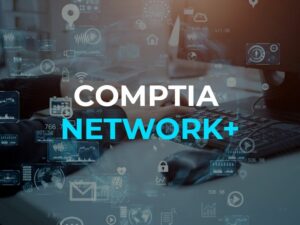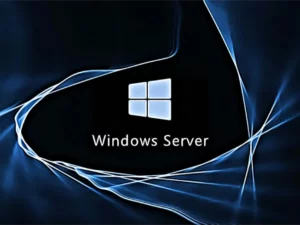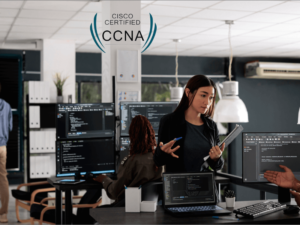CCNA: Introduction to Networks
- Description
- Curriculum
- FAQ
- Notice
- Reviews
- Grade
Course Overview
Ready for a career in the world of technology? People around the world depend on the Internet to work, meet, educate, play, and even order dinner — and none of this would be possible without networking professionals. So if you’re thinking about changing careers or pursuing new opportunities, think about IT!
Build the skills you need for associate-level job roles like Network Administrator, System Administrator, or Network Engineer in this three-course series. You will also get ready to take the Cisco Certified Network Associate (CCNA) certification exam, an industry-recognized credential that validates your expertise and opens doors to exciting professional opportunities.
Start here with CCNA: Introduction to Networks, the first course in the series. From understanding network architectures and protocols to mastering IP addressing and Ethernet fundamentals, you’ll develop foundational knowledge and build your networking basics. This course also includes interactive labs and real-world scenarios to help you gain practical experience in building local area networks (LANs), implementing network security measures, and configuring routers and switches.
CCNA: Introduction to Networks (ITN) covers the architecture, structure, functions and components of the Internet and other computer networks. Students achieve a basic understanding of how networks operate and how to build simple local area networks (LAN), perform basic configurations for routers and switches, and implement Internet Protocol (IP).
Objectives
By the end of the course, students will be able to:
- Configure switches and end devices to provide access to local and remote network resources.
- Explain how physical and data link layer protocols support the operation of Ethernet in a switched network.
- Configure routers to enable end-to-end connectivity between remote devices.
- Create IPv4 and IPv6 addressing schemes and verify network connectivity between devices.
- Explain how the upper layers of the OSI model support network applications.
- Configure a small network with security best practices.
- Troubleshoot connectivity in a small network.
Requirements
The curriculum is appropriate for students at many education levels and types of institutions, including high schools, secondary schools, universities, colleges, career and technical schools, and community centers.
Carrier Prep
By the end of the CCNA course series, students gain practical, hands-on experience preparing them for the CCNA certification exam and career-ready skills for associate-level roles in the Information & Communication Technologies (ICT) industry.
Prerequisites:
None. Vocational students often take IT Essentials or equivalent knowledge prior to CCNA
Estimated Time to Complete: 100 hours
Recommended Next Course:
CCNA: Switching, Routing, and Wireless Essentials
-
1Chapter 1: Introduction to computer networkingTrial 60 min
-
2Chapter 2: Basic Switch and End Device ConfigurationTrial 60 min
-
3Quiz: Mobile / Native AppsTrial 5 questions
-
4Chapter 3: OSI Model and TCP/IP SuiteTrial Text lesson
-
5Chapter 1: Cisco IOS AccessTrial 30 min
Common methods for accessing the Cisco Internetwork Operating System (IOS) on Cisco networking devices such as routers and switches.
Productivity Hacks to Get More Done in 2018
— 28 February 2017
- Facebook News Feed Eradicator (free chrome extension) Stay focused by removing your Facebook newsfeed and replacing it with an inspirational quote. Disable the tool anytime you want to see what friends are up to!
- Hide My Inbox (free chrome extension for Gmail) Stay focused by hiding your inbox. Click "show your inbox" at a scheduled time and batch processs everything one go.
- Habitica (free mobile + web app) Gamify your to do list. Treat your life like a game and earn gold goins for getting stuff done!

The 50-hour, self paced course is the 1st of 3 courses in the Cisco CCNA Enterprise curriculum. The course includes activities using Packet Tracer, hands-on lab work, and a wide array of assessment types and tools.
The curriculum is appropriate for students at many education levels and types of institutions, including high schools, secondary schools, universities, colleges, career and technical schools, and community centers.
Students interested in pursuing an IT-related career






